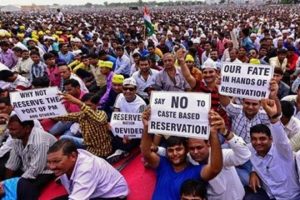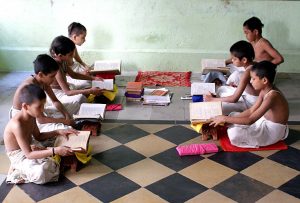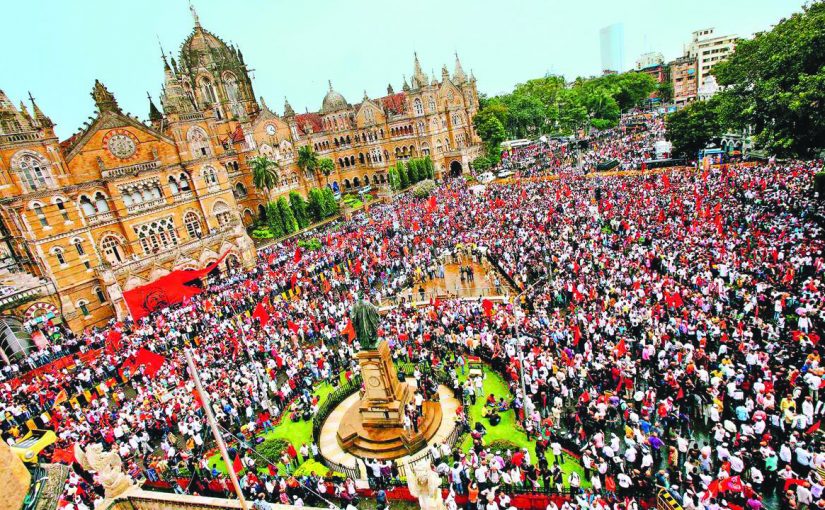Silent protest: The Marathas who trace their origin to Shivaji Maharaj but have turned farmers and account for 30% of the population of Maharashtra have been granted 10% quota in jobs and educational institutions even though they are both socially and economically forward. Young Marathas do not want to do farming but want skilled jobs
BY RAJAN NARAYAN
In the wake of the reverses suffered by the BJP in Madhya Pradesh, Rajasthan and Chhattisgarh, a few crumbs have been thrown at the upper castes to appease them in the run up to Parliamentary elections. The Constitutional Amendment providing a quota in Government jobs and admissions to educational institutions is intended to benefit the Marathas and Jats who have been agitating for reservations. The upper castes, suspected to have voted against the BJP in the Hindu heartland, are expected to help stop the BJP slide in return…
Over the years the Central and state governments have given into pressure from vote banks to grant an increasing number of group reservations. Constitutionally, the only groups that were eligible for reservations for government jobs and admission to educational institutions were the scheduled castes and the schedule tribes.
More and more groups in various states claimed that they had been excluded from the list of Centrally recognized schedule caste and tribes. The expression schedule caste specifically refers to the Harijans who were re-named Dalits by Dr Ambdedkar. The schedule tribes are of course tribal people who lived in and off forest produce and were the original residents of a region.
In Goa for instance, though it was accepted that the Gaudis, Velips, Kunbis and Dhandgats are clearly tribals, they did not get Central recognition until a couple of years ago. Besides representations in jobs and education, schedule castes also have representation in the Legislative Assembly in proportion to their population in a constituency.
Since there were no schedule castes or Harijans in significant numbers in any constituency in Goa, by rotation one constituency is allotted to the schedule castes which is always allotted to Babu Azgaocar. The schedule tribes are still waiting for representation in the Goa Assembly which might or might not come before the next election.
BACKWARD CLASSES
Over the years the Central and State governments have extended reservations to other backward classes.
Except for Brahmins almost every class or caste in the country has managed to bully its way into the backward class category. Logically any community group should feel ashamed about being officially called backward. But when it comes to government jobs and admission to professional colleges even the most forward community fight to be declared backward.
As recently as two months ago the government of Maharashtra declared Marathas who were originally soldiers, but are now primarily farmers, as backward class. This followed a state-wide agitation by farmers which was exceptionally nonviolent. Lakhs of farmers from all over Maharashtra marched on foot travelling hundreds of kilometres to Mumbai, the seat of government. From the entrance to Mumbai they marched to the Azad Maidan, which is a popular meeting place, silently, without even disrupting traffic, winning the hearts of people everywhere with their conduct.
The income from farming has come down very sharply following the use of tractors and other mechanical equipment. So much so the number of jobs in farming have come down. Frustrated youth, who are not interested in farming any way, started demanding quotas in government jobs and reservations.
Similarly the Jats, the warrior class, spread over Rajasthan, Haryana, UP and MP, and they have also been demanding backward class status. This despite the fact that Jats are both economically and socially forward.
As in the case of Marathas in Maharashtra, most of the chief ministers, officials, professionals and officers in the Armed forces are from the Jat community. In some states like Punjab they are also the biggest farmers. For similar reasons that provoked the youth in Maharashtra to demand reservations, the Jats also agitated and got the Central government to recognize them among other backward classes.
In Goa it is the Bhandaris who have been the most powerful community who virtually control Goa, second only to the Brahmins. As in the case of the Jats, chief ministers and even union ministers like Ravi Naik and Shripad Naik, the Minister for Ayush, are from the Bhandari community.
There are also many professionals from the community like Dr Deep Bhandari and Dr Shyam Bhandari. Similarly, even among the academic community and government servants, the Bandaris are well represented. But since they form a very large part of the Hindu vote bank the government cannot say No to them.
Ironically, the much more backward classes like the migrant Lamanis do not get any benefits in Goa. On the contrary when a Lamani on merit managed to get himself a taxi driving license in Benaulim, the taxi mafia headed by Churchill Alemao tried to get it cancelled.
Since political parties in the states and the Centre compete with each other to create more vote banks, the number of groups getting reservations keep increasing. There are states in the country where more than 95% of jobs in government and vacancies in professional colleges are reserved for backward classes.
TAMIL NADU PIONEER
In Tamil Nadu which was the earliest state in the country run entirely by Dalit leaders, the reservation was 100%. So much so that even if a Brahmin got 99.99% in his HSSC he could not get admission to any government engineering college in Tamil Nadu.
Tired of the reservation mela the Supreme Court passed an order excluding the creamy layer of the backward classes and even schedule castes and schedule tribes from reservations. This meant that SCs, STs and OBCs who came from high income backgrounds and with family in senior positions in the government would not be entitled to claim benefits like government jobs and reserved admission to professional colleges.
Unfortunately this directive of the Supreme Court has been openly defied by the state governments which are more interested in votes than merit. The other problem off course is that the most backward who converted themselves into Buddhists under the leadership of Ambedkar are not entitled to quotas.
Similarly, only some Christian and Muslim communities are entitled to reservations. This applies even to poor Catholics and Muslims like coconut pluckers, carpenters and other craftsmen among Muslims. Even worse, major traditional occupation of slaughtering and selling beef, a monopoly of the Muslim community in the past, has now become very dangerous.
QUOTAS FOR JOBS

Right from the time India became a republic there have been the repeated demand that the criteria quotas in jobs and admission to personal colleges should be economic and not caste have been made. The logic being that it is the poorest of the poor belonging to any community who requires support. Moreover under the Constitution the reservations were to last only for a limited period of time till the community reached parity with the upper castes. However, reservations became permanent because having enjoy the fruits nobody wanted to cut the tree.
If I had studied in Tamil Nadu or if my children had topped the class in every subject including maths, they would not get admission to medical or engineering colleges. This is true in many states which have quotas going up to 90% or more despite Supreme Court stipulation that the maximum of all reservations should not exceed 50%. Which is why we welcome the decision by the Modi government to provide 10% quota for the poor upper class. To be eligible for this reservation the household income should be less than `8 lakh a year. It must be noted that the reference is to household income and not the income of the only individuals forming the household. It also stipulate that the beneficiary should not have a house of more than 1000 sq feet which is very liberal as even middle class residents on Bombay have houses of only 500 or 600 sq feet. The entire basis for the new quota would be economic status and not caste status. This is for the first time that reservation are being offered without taking into consideration community or caste and is open to everyone including the highest caste.
ONLY ST & SC
Historically, the principle of reservations for the scheduled castes and tribes in the Constitution, was based on the logic that they had been exploited by the upper castes through millenniums. The scheduled castes who were specifically referred to as the Harijans were forced to do all the menial work. According to the Manusmriti which is the Bible of the RSS, only Brahmins were permitted to read and write. The four caste division of Brahmins, Kshatriyas, Vaishyas and Sudras (renamed Harijans by Mahatma Gandhi) perpetuated the domination of society by the Brahmins.
When the Constitution was debated Dr L K Ambedkar who was himself a Harijan insisted reservations in government jobs and admission to educational institutions should be provided to the lowest of the low.
The objective was to bring them on par with at least the other classes, if not the Brahmins themselves. Unfortunately, this created a precedent and not only the Harijans who were classified as scheduled class in the Constitution, but other groups also started demanding a share of the government job pie and admission, particularly to professional colleges.
Every state in the country treated various castes as vote banks. An amendment was passed in the Constitution which provided that the concessions or reservations could also be extended to other backward classes. Under this definition excepting for the Brahmins all other categories were eligible to claim reservations. This went to such a ridiculous extent that in states like Tamil Nadu which was ruled by the backward classes, reservations almost touched 100 percent. In 1992 Indra Sawhney, a leading lawyer, moved the Supreme Court which ruled that the total reservations could not exceed 50%.
Despite this, states continued to find ways of extending reservations to socially and politically advanced groups like the Marathas in Maharashtra and the Rajputs in the northern belt which includes Rajasthan, Madhya Pradesh and Uttar Pradesh.
The upper castes voiced their demand by pointing out that due to mechanization and the disinclination of generation next within their communities to take to agriculture, there was huge employment amongst the youth. This was true to a large extent and recently the Maharashtra government reserved 20% of the seats in professional colleges and government jobs for the Marathas. In the run-up to the 2019 Parliamentary elections it is almost certain that the Rajputs would also get the privilege of becoming backward.
Under the proposed Constitution amendment, 10% of the socially advanced but economically backward would be entitled to reservations in colleges and government jobs. This will primarily benefit the Brahmin community. Except that the government has either been overgenerous or the Brahmins who already occupy the top positions have managed to get more than they deserve. As it has been pointed out, while the limit for income tax exemption is only `2.5 lakh per individual, under the new amendment any individual earning upto `8 lakh and having a flat no larger than 1,000 sq ft would be eligible for reservations for jobs and admission to colleges.
The Brahmins who are on top of the hierarchy have always enjoyed an advantage as they were obliged and encouraged to

study. By virtue of their status they also got key jobs in the bureaucracy. In several states even politics was dominated by the Brahmins. Although the Brahmins did not have any reservations and were perhaps discriminated against, they are by no means deprived. It is still easier for a Brahmin to get a government job and join the competitive Indian Administrative Service or the Indian Institute of Technology than for a genuine SC or ST to pass through the eye of a needle. Some concessions are valid and necessary but the criteria must be much more stringent in the light of the fact that the household income ceiling for the other categories is only `80,000 whereas for the so-called ‘economically backward’ the ceiling is as high as `8 lakh per individual. Whether the new amendment which was passed within 48 hours by both the Lok Sabha and the Rajya Sabha with all political parties supporting it will increase Modi’s vote tally is yet to be seen.
